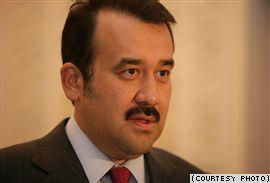 Karim Massimov defends growing links with China
Karim Massimov defends growing links with China
A visitor who recently dropped in on Karim Massimov found Kazakhstan's prime minister with his feet on his desk reading a book about Chinese philosophy.
Educated in Beijing and Hunan, Mr Massimov is an expert on China. And that is important these days. This year alone, his government has won $15bn (€10bn £9bn) of financial assistance from China, promising Kazakh oil, metals and food supplies in return.
But the loans, coming as China overtakes Russia as Kazakhstan's biggest trading partner, have come at a political price and stoked fears in some circles of a creeping Chinese colonisation in the oil-rich central Asian country.
Mr Massimov argues that China poses no threat to Kazakhstan's independence. "We are balancing our interests between China and Russia. As long as there is balance it is okay. No one can put pressure on us," he told the Financial Times.
The Chinese loans are helping Kazakhstan battle a recession that set in after the global credit crunch halted foreign lending to its highly leveraged private banks. Falling oil prices have also taken a toll on the economy, exposing Kazakhstan's over-reliance on energy exports.
Russia has lowered investment in Kazakhstan since the crisis plunged it, too, into recession. Western financial institutions, smarting from huge debt writedowns at Kazakh banks, are unlikely to resume lending soon.
"Our policy is very pragmatic," said Mr Massimov. "We have to catch the wave of growth in China."
Since the Soviet Union dissolved in 1991, Kazakhstan has performed a delicate geopolitical balancing act, sharing its vast oil resources between Russia, China and the west. But the global recession has allowed China to race ahead by snapping up oil assets and expanding into the broader economy.
China lent Kazakhstan $10bn in April to lock in future oil supplies and pay for the Chinese National Petroleum Corporation to take a stake in MMG, Kazakhstan's fifth biggest oil producer that Russia's GazpromNeft had earlier tried to buy. An oil pipeline CNPC built in 2006 to carry oil from Kazakhstan to China has been expanded to carry up to 400,000 barrels a day of oil, one fifth of the country's exports.
Hu Jintao, the Chinese president, visited Astana this month to celebrate the opening of a new gas pipeline from central Asia to China, and offered a further $5bn of funding for oil refining, nuclear power, metals and agricultural projects.
Mr Massimov said moves to deepen economic integration with Russia would offset the growth of China's influence in Kazakhstan.
After more than a decade of discussion, Russia, Kazakhstan and Belarus agreed last year to form a customs union providing the three countries with duty free access to a common market of 170m people.
And in a move to increase energy co-operation, VEB, the Russian state bank, has agreed to help fund construction of a new power plant in Kazakhstan to boost electricity exports to Russia.
Nonetheless, China's growing presence in Kazakhstan has stirred historic fears of Beijing's imperial ambitions. Kazakh activists protested last week against China's proposal to lease Kazakh farmland near its western frontier, which they see as the start of a Chinese invasion.
Mr Massimov said Kazakhstan was negotiating an agreement with China to fund farming projects in Kazakhstan. "We are not giving China any land. The land code forbids it. But if we have a buyer [for crops], be it China or Arabia, then let's sell," he said.
www.ft.com




